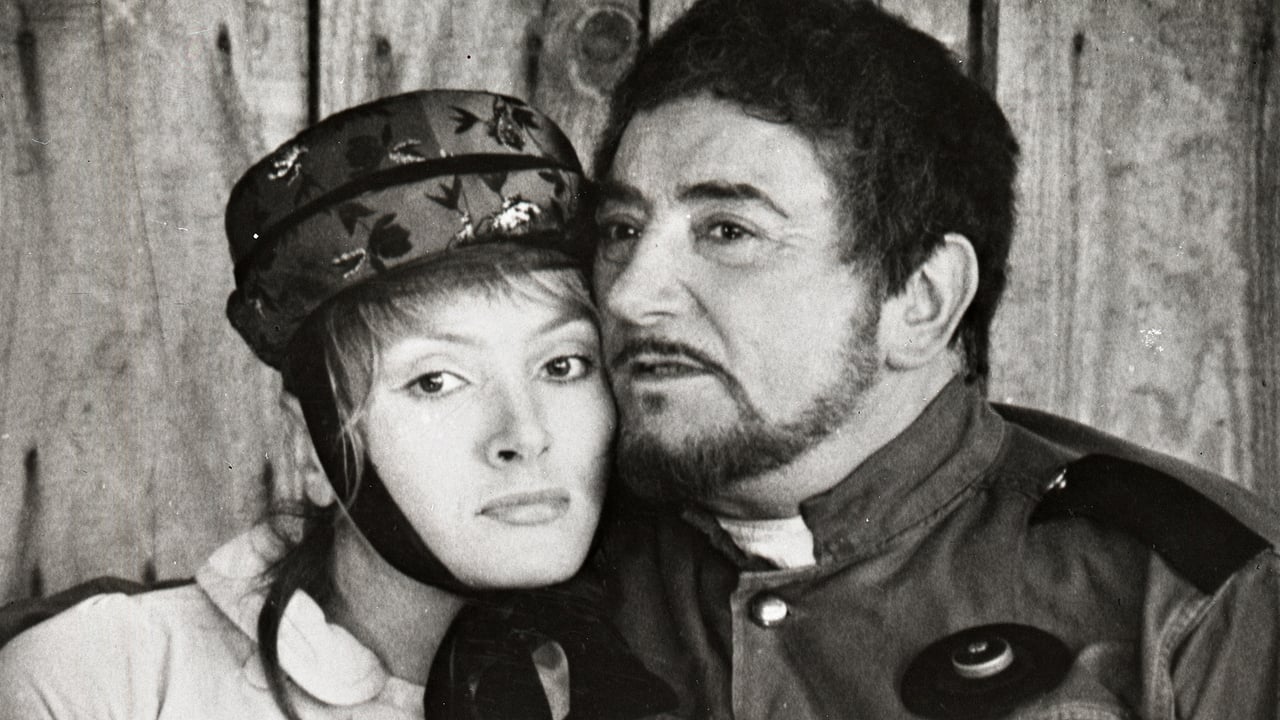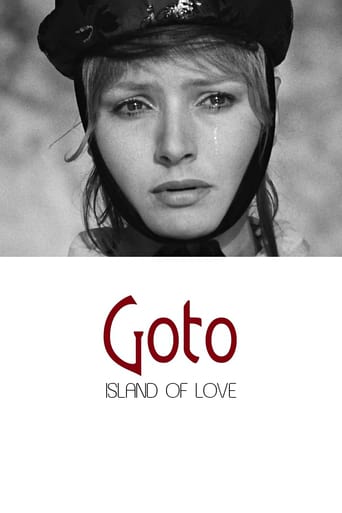Harockerce
What a beautiful movie!
Kirandeep Yoder
The joyful confection is coated in a sparkly gloss, bright enough to gleam from the darkest, most cynical corners.
Brenda
The plot isn't so bad, but the pace of storytelling is too slow which makes people bored. Certain moments are so obvious and unnecessary for the main plot. I would've fast-forwarded those moments if it was an online streaming. The ending looks like implying a sequel, not sure if this movie will get one
Cassandra
Story: It's very simple but honestly that is fine.
Tom Dooley
This was the debut feature from infant terrible producer Walerian Borowczyk who went on to make such films as 'Blanche', 'Immoral Tales',and 'Behind Convent Walls' ' and became known for his use of sexual scenes or art house porn, which does not appear very much in this film.Set on an archipelago that has suffered a major natural disaster we find a community stuck in the past. They are cut off from the outside world they have stubbornly maintained the status quo.Their leader is Goto who has assumed Kingship by some constitutional necessity. He seems to look on his subjects as he does his pet Alsatian dogs and is married to the beautiful Glyssia played by Ligia Branice ('Blanche'). One of the forms of entertainment is the public fights, which take place on a ropey stage where talentless musicians torture home made instruments in a sort of 'end of pier show' and display of awfulness. These fights are punishment for all crimes whether theft or murder and the loser is executed.Grozo survives one such encounter and is spared. His reward is to be the royal boot polisher - keeper of the royal dogs and maker of fly traps. He lusts after Glyssia like a sixteen year old and his first crush. She however, has fallen for a dashing officer - and keeper of the royal horse - and they have decided to escape. Grozo though could teach Machiavelli a thing or two and soon his plan to gain power, which will lead to requite his lust, is in full motion.This is an Art-house film which is filmed in monochrome, but several parts are in Eastman colour for dramatic and stylistic effect, most of the camera angles are fixed - adding to the voyeuristic nature of the film. Walerian Borowczyk was developing his style here and he won't be to everyone's taste. Some could view this as self indulgent, cold and even dystopian and that is the whole point. The use of props, shots and scenarios are designed to craft a world that we are asked - not to accept - but to at least try to understand. It is that final part that makes him such an interesting director. This then is arty on purpose, quirky and far from run of the mill and for film historians is probably a must see.
jaibo
Walerian Borowczyk directed some of the most strange, memorable and intense films of the 1970s and early 80s, all of them concerned with the trials and tribulations of human desire in periods and environments of repression. In 1968 he had begun his live-action feature film making career (after a beginning in animation) with the quite extraordinary Goto, Island of Love.A film unlike any other, Goto tells the story of an island community which has been cut off from the rest of the world after a natural cataclysm. The island is rules by an avuncular despot, Goto, who presides over a ritualistic society in which felons are tested through trial by combat (to the death) and everyone is obsequiously serving his whims. One of the combatants, Grozo, is freed after fighting a huge bully at the request of Goto's beautiful wife Gonasta. Then, like Melvyn Peake's Steerpike in the Gormenghast books, Grozo begins a murderous climb from palace servant to become governor himself. Unfortunately for Grozo, his impulse for this social climbing - the love of Gonasta - is forever unfulfilled as she kills herself after he machinates the death of her lover, the handsome equestrian officer Gono.Where is this island? It's a kind of Grimm's fairy tale land crossed with a dreamscape based on eastern European culture circa the 1890s. Yet whilst the world the story inhabits is pure invention, the emotional story re-enacted is universal in its application. It is as if Borowczyck has stripped human life to its bare essentials - impulse leads to action but action is frustrated. Sometimes this frustration is highly comic (the film is funny like a classic silent clown show, and owes some debt to the absurdist theatre of Beckett, Genet and Ionesco); sometimes the frustration is deeply moving, as when Gonasta watches the small boat she'd planned to escape the island with her lover in sinking slowly beneath the waves. Here as elsewhere the film is back-scored with Handel, the yearning sound of which adds to the eternal feelings of the story on display.The film has obviously been done on a tight budget, with some kind of dilapidated factory building dressed as Goto's palace. As in later Borowczyck, old ornaments and collected antiques crowd the walls and tables, abandoned by their departed owners and maintaining a steadfast existence in materiality which is denied those miserable creatures the humans who made them. Despite the obvious theatricality and artifice of the world on display, Borowczyck manages to suck the viewer into the very raw emotions of the tale.Goto, Island of Love, title aside, isn't as erotic as Borowczyck's later, more notorious, masterpieces. Yet like them it affirms that behind every act is a desire for either sex or power, shows a terrible yearning reaching for impossible satisfaction and shows that the mechanisms we create, our societies and their bric-a-brac, have a curious and somewhat terrifying tendency to imprison and outlast our frail but full of desire human bodies.
MARIO GAUCI
After having long wanted to watch this, I finally caught up with Borowczyk's feature-film debut on DVD-R while I was in Hollywood in late 2005. As it happens, only days later it was announced for release on R1 DVD - and not long after that, the director himself passed away! Anyway, even if the copy I first watched didn't include the brief color shots that were a part of the original version (and which, thankfully, are intact on the Cult Epics DVD), I was still highly impressed with the film - counting it not just among the most original and remarkable debuts ever but, along with its follow-up BLANCHE (1971), Borowczyk's finest work! Virtually all of the director's stylistic qualities and thematic interests are already to be found here (save perhaps the religious aspect which would be out of place in such a remote totalitarian setting as the one in which the events unfold); as was to become increasingly evident in subsequent efforts, eroticism is at the core of the plot which is quite simple really, as the film is best approached as an allegorical fable and mood piece - or, if you like, merely a canvas for former animator Borowczyk on which to scrape his ideas, methodically shaping his own distinctive vision (David Thomson in "Time Out" calls it a veritable art film, not because of its occasional pretentiousness but for the way in which one is always conscious of its being essentially a work of artifice).Typically of Borowczyk, then, the detail is obsessive, memorable and often surreal: the fact that the first name of the entire population starts with the letter G; the three-way portrait of Goto's current ruler and his two predecessors hung on the school-room walls (wherein the only history being taught is that of the island itself); the unusual way in which prisoners - all crimes, whether big or small, seem to be punishable by death - are executed (they're brought before the court in pairs and made to engage in physical combat, with the loser eventually being beheaded while the winner is set free!); equally disturbing is the social structure on the island (the father of the Governor's wife attends to the 'royal' kennels while her mother is one of the prostitutes in the local brothel), etc. Another important aspect of the film which became synonymous with virtually all of Borowczyk's subsequent features is his unnerving juxtaposition of absolute silence and deafening organ music (in this case, the work of Handel).Things come to a head when Grozo, an ambitious and lecherous man saved from the gallows (played by Guy Saint-Jean), is employed by the Governor - a majestic Pierre Brasseur in one of his last roles - in the kennels (as well as Goto's official fly-catcher and boot-polisher!); his envy of both the latter's position and wife sends him on a spiral of murder and deception till he has replaced him on the 'throne' and intends to take Glossia (the graceful Ligia Branice, Borowczyk's own wife, who's actually having an affair with her dashing horse-riding instructor and who had even planned to flee the island by boat!) for himself; by the end of the film, however, he's all alone, desperate and on the verge of madness. In conclusion, though admittedly obscure and deliberately paced, the film is nevertheless vivid, constantly imaginative and, ultimately, haunting.
Infofreak
Walerian Borowczyk is rarely mentioned these days but back in the 1970s and 1980s he created quite a stir with arthouse/soft porn movies like 'Immoral Tales', 'Behind Convent Walls', 'Dr Jekyll and His Women', and especially his sensational 'The Beast', which is still quite unlike any movie you've ever seen, believe me! So I was very interested to be able to watch 'Goto', which I believe was his first full length feature. It doesn't have the sexual content you might expect (there is some very brief nudity, but that's it really), but it's still VERY odd, even for Borowczyk, and utterly fascinating. The story is set on the island of Goto, which after a natural disaster in the late 19th Century, has kept its society frozen in the past. Nothing much changes and everything is static and ritualized. This makes the plot reminiscent of Kafka and Mervyn Peake. Mentioning those two might give you SOME idea of what to expect, but it's a very difficult movie to categorize or describe. It's nowhere near as outrageous as some of Borowczyk's later and better known work, but if you treasure strange and unusual movies I highly recommend you track it down.

